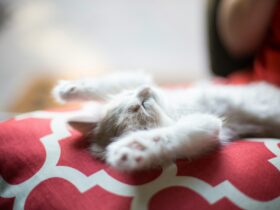Blog: Persian Cat Breed Information & Characteristics | How to Help an Underweight Cat Gain Weight
Introduction
Maintaining a healthy weight is crucial for the overall well-being of your Persian cat. Underweight cats, including Persians, can face a range of health issues, from nutritional deficiencies to compromised immune function. Understanding the causes of underweight in cats and implementing effective strategies to help them gain weight can significantly improve their health and quality of life. This blog will guide you through the reasons behind underweight issues in Persian cats and provide practical tips for helping them gain weight.
Understanding Underweight in Cats
1. Common Causes of Underweight
- Inadequate Nutrition: Cats that do not receive a balanced diet may not be getting enough calories or essential nutrients to maintain a healthy weight.
- Medical Conditions: Various health issues can lead to weight loss, including hyperthyroidism, diabetes, gastrointestinal disorders, and parasites.
- Dental Problems: Painful dental issues can make eating difficult, leading to weight loss.
- Stress and Anxiety: Environmental changes or stress can affect a cat’s appetite and eating habits, resulting in weight loss.
- Age and Activity Level: Kittens and older cats may have different nutritional needs and activity levels that can influence their weight.
Assessing Your Persian Cat’s Weight and Health
1. Evaluating Body Condition
- Body Score: Use a body condition score chart to assess your cat’s weight. A healthy cat should have a visible waist and a slight abdominal tuck. An underweight cat will have prominent ribs and a noticeable waistline.
- Weight Tracking: Regularly weigh your cat and monitor changes. Sudden or significant weight loss should be addressed with your veterinarian.
2. Veterinary Check-Up
- Health Examination: Schedule a thorough veterinary examination to rule out underlying medical conditions that may be causing weight loss.
- Diagnostic Tests: Your vet may recommend blood tests, x-rays, or other diagnostic procedures to identify any health issues contributing to your cat’s underweight status.
Effective Strategies for Helping an Underweight Cat Gain Weight
1. High-Calorie, Nutrient-Dense Diet
- Premium Cat Food: Choose high-quality, premium cat food formulated for weight gain or increased caloric intake. Look for products with high protein and fat content.
- Wet vs. Dry Food: Wet food often has higher calorie density and is more palatable for cats, making it a good choice for weight gain.
- Meal Frequency: Increase meal frequency by offering smaller, more frequent meals throughout the day to boost caloric intake.
- Feeding Guidelines: Follow the feeding guidelines on the food packaging but adjust based on your cat’s specific needs and your vet’s advice.
2. Caloric Supplements
- High-Calorie Supplements: Use high-calorie supplements designed for cats to increase their calorie intake. These supplements come in various forms, including gels, pastes, and powders.
- Example Product: Royal Canin Feline Care Nutrition Recovery – A high-calorie gel that provides essential nutrients for weight gain.
3. Improving Appetite
- Palatable Foods: Offer a variety of high-quality, flavorful foods to stimulate your cat’s appetite. Consider warming the food slightly or adding a bit of low-sodium broth to make it more enticing.
- Feeding Techniques: Use puzzle feeders or interactive toys to make mealtime more engaging and encourage your cat to eat more.
4. Addressing Medical Issues
- Dental Care: If dental problems are affecting your cat’s ability to eat, consult your vet for dental cleaning or treatments to alleviate pain and improve eating.
- Treating Health Conditions: Work with your vet to manage any underlying health conditions that may be contributing to your cat’s weight loss.
5. Managing Stress and Environment
- Stable Environment: Create a calm, stable environment for your cat to reduce stress. Avoid sudden changes and provide a safe space where your cat feels secure.
- Reduce Competition: If you have multiple pets, ensure that your underweight cat has access to food without competition or stress.
Monitoring and Adjusting Your Cat’s Weight Gain Plan
1. Regular Weigh-Ins
- Track Progress: Regularly weigh your cat to monitor weight gain. Gradual weight gain is more sustainable and healthier than rapid increases.
- Adjust as Needed: If your cat is not gaining weight as expected, consult your vet to adjust the feeding plan or address any new health concerns.
2. Ongoing Veterinary Care
- Regular Check-Ups: Continue with regular vet visits to monitor your cat’s health and adjust their diet and weight management plan as needed.
- Nutritional Advice: Seek ongoing nutritional advice from your vet to ensure your cat’s diet is balanced and meeting their needs for weight gain.
Conclusion
Helping an underweight Persian cat gain weight requires a multifaceted approach, including providing a high-calorie diet, addressing any underlying health issues, and creating a stress-free environment. By implementing these strategies and working closely with your veterinarian, you can support your Persian cat in achieving and maintaining a healthy weight, ultimately improving their overall well-being and quality of life.











Leave a Reply